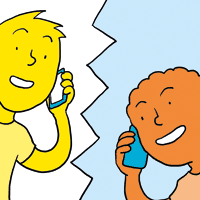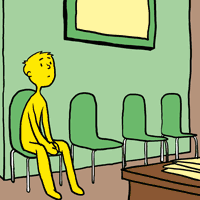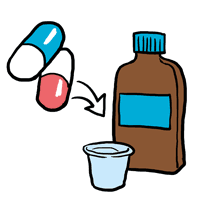
Words accentuated <such> are definitions given in the Authorised Version 22. Mental Health Act 2014 at 1 March 2020
A natural person, adult, with Recognised Disability a <consumer>, who is not, a <domestic partner, aboriginal, diverse, patient>, who hasn't enacted an <advance statement>, has no requirement for <Nominated persons> & is not subject of any <Order>.
The <consumer> is supported in a <care relationship> under the Act. The <carers> within the meaning of the Act are not engaged by a <designated mental health service> or providers of other health, disability, community support services, to be in a <care relationship>.
Consumer arriving by ambulance to EH ED had a carer attend with them for support in ED. The consumer was intoxicated, visibly symptomatic consistent with their mental illness & in the opinion of the carer had diminished capacity to communicate clearly, history, diagnosis, medications & reason 000 call. The carer asked to remain in the ED foyer (not because of Covid), they weren't recognised as a domestic partner, emergency contact, carer. Staff informed the carer they didn't have consumer consent to provide information & the carer would have to take a seat until called. The carer left the ED waiting area after some 40 minutes feeling not only the trauma of the event but the trauma caused by, what they felt was, the total lack of respect for a carer of a consumer living with mental illness. Sometime later the consumer sent a txt to the carer asking “why am I alone?”
Without limiting the objectives <Part 2 Objectives & mental health principles.>. I believe EH failed to achieve its obligation under S.10(h) <to recognise the role of carers in the assessment, treatment & recovery of persons who have mental illness; > & therefore, in my opinion, failed S.10(b) < to provide for persons to receive assessment & treatment in the least restrictive way possible with the least possible restrictions on human rights & human dignity; > this failure causing distress to the both consumer & carer while I feel, undermining confidence in EH's ability to meet its:
*Vision; Great care, everywhere, every time.
*Goal; Healthcare Excellence.
*Values; Patients First, Kindness, Respect, Excellence, Agility & Humility.
Within a week the consumer arrived at EH ED by ambulance. Another carer arrived at EH ED before the ambulance, attended to Covid check-in, then ED desk to support the consumer. The carer was asked to remain in ED foyer while staff sought consent. The carer, aware of the requirement to presume consumer had capacity to give consent. Sixty-three minutes later in the ED foyer, carer notices the consumer staggering out the public entrance. Carer called the consumer's name & apprehended them at the public roadway. Returned the consumer to ED where desk staff immediately opened the automated doors to the ward, carer was directed to the consumer's cubical where there was five or more clinical staff waiting, one thanked the carer.
The carer informed staff that they were responsible for the original 000 call. The carer found it necessary to make reference to both the MH Act & Carers Recognition Act to staff & the attending Dr. before being permitted to remain bedside. The attending Dr. said they had little knowledge of the Acts.
After medical investigation, pharmaceutical support & psych triage consumer was relocated ED to EH IPU, a voluntary admission to receive further assessment of, and treatment for mental illness & active suicidal ideation.
After IPU admission, carer phoned the consumer. The carer believed the consumer was unsure of where they were, sounded sedated, expressing that anything was better than ED & they had a real bed. 12 hours after IPU admission, no contact was made with carer. When contacted by IPU staff, carer was informed TCTO may be requested. Carer agreed that given recent events, they believed that would be to the benefit of the consumer.
Consumer contacted carer the following day to inform of planned discharge that day. Carer re-engaged staff regarding discharge planning & safety concerns. During telephone contact with attending IPU Dr., the carer was informed there was no requirement for a discharge meeting as the patient was not under MH Act. After voicing concerns regarding the medication the consumer may be given upon discharge because of current history, medication misuse, active suicidal ideation, recent attempts & AOD concerns, carer was informed the meds had already been discussed with the patient, written-up & were not a matter for the carer. The carer asked to be transferred to the attending Dr’s supervisor.
The supervisor, when asked if carer input mattered to EH for voluntary IPU admission & discharge under the MH Act, the carer thought it was as if the line went dead!
When, as the carer believed, Dr. had taken a moment to reflect on the question the Dr. asked the carer, what concerns they held regarding discharge safety & supervision. The carer answered, requesting that the source of the answer & its content be held in confidence under the MH Act as they believed disclosure would jeopardise the care relationship. Dr. said that in order to convey to the patient, the Dr’s preference was to extend voluntary a few more days. Dr. needed to disclose carer concerns as the patient was not under the MH Act. The consumer was then informed of what was said & by whom.
Hours later the consumer was discharged with a damaged care relationship, medication, no safe plan, no additional carer consultation.
Hours after discharge, meds in combination with the consumer’s substance of choice were used. The consumer, intoxicated, without capacity, found alone in their home & carers alone were able to avoid another EH. ED. AMHS. merry-go-round.
In my opinion, we carers know we will be on it again, & do not foresee service improvement at EH. Why should we?
Team work
Keeping in touch
Involved in decisions
Reception
Medication
Treatment
Seeing the whole me
Doctor









Responses
See more responses from David Plunkett